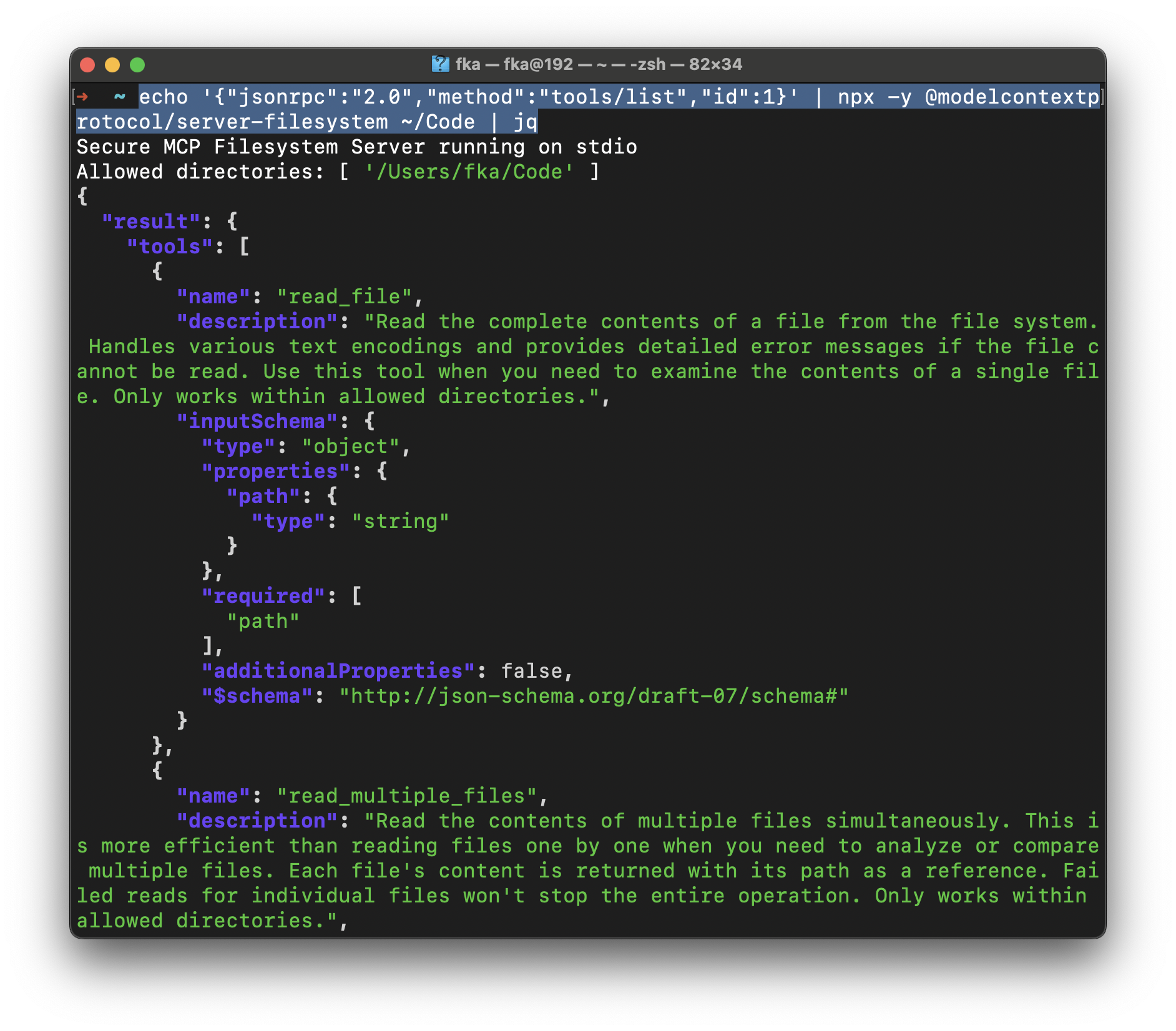While the Model Context Protocol (MCP) is primarily designed for AI assistants like Claude Desktop, Windsurf or Cursor, it’s incredibly useful to be able to inspect and test MCP servers directly from the command line. In this tutorial, I’ll show you how to use standard CLI tools and jq to interact with MCP servers, making development and debugging much easier.
Prerequisites
Before we begin, make sure you have:
- An MCP server to test (you can use any from my previous tutorials)
jqinstalled (brew install jqon macOS)- Basic familiarity with JSON and command-line tools
Understanding the MCP Protocol
MCP uses JSON-RPC 2.0 over stdio or SSE transport. For CLI testing, we’ll focus on stdio transport, which means we can simply pipe JSON messages to our server’s stdin and read responses from stdout.
The basic structure of an MCP request is:
{
"jsonrpc": "2.0",
"method": "method/name",
"id": 1,
"params": {}
}
Listing Available Tools
Let’s start with the most basic operation: listing available tools. Here’s how to do it:
echo '{"jsonrpc":"2.0","method":"tools/list","id":1}' | npx -y @modelcontextprotocol/server-filesystem ~/Code | jq

This command:
- Uses
echoto send a JSON-RPC request - Pipes it to an MCP server (in this case, the filesystem server)
- Uses
jqto pretty-print the JSON response
The response shows us all available tools and their input schemas. From the screenshot, we can see the server provides:
read_file: For reading single filesread_multiple_files: For efficiently reading multiple files at once
Testing Individual Tools
Once you know what tools are available, you can test them directly. Here’s how to test the read_file tool:
Here’s the JSON-RPC:
{
"jsonrpc": "2.0",
"method": "tools/call",
"params": {
"name": "read_file",
"arguments": {
"path": "/Users/fka/Code/blog/CNAME"
}
},
"id": 2
}
And here’s how to execute it:
echo '{"jsonrpc":"2.0","method":"tools/call","params":{"name":"read_file","arguments":{"path":"/Users/fka/Code/blog/CNAME"}},"id":2}' | npx -y @modelcontextprotocol/server-filesystem ~/Code | jq
Exploring Resources
MCP servers can also provide resources. List them with:
echo '{"jsonrpc":"2.0","method":"resources/list","id":3}' | mpc-server-exec | jq
Useful jq Filters
Here are some helpful jq filters for working with MCP responses:
- Get just the tool names:
... | jq '.result.tools[].name' - Get detailed info about a specific tool:
... | jq '.result.tools[] | select(.name == "read_file")' - Extract input schema:
... | jq '.result.tools[] | select(.name == "read_file") | .inputSchema' - Get call response:
... | jq '.result.content[].text'
Creating Shell Helper Functions
To make testing easier, you can create shell functions for common operations. Add these to your .zshrc or .bashrc:
# List MCP tools
mcp_tools() {
local server_command=("${@}")
echo '{"jsonrpc":"2.0","method":"tools/list","id":1}' | "${server_command[@]}" | jq
}
# Call an MCP tool
mcp_call() {
local tool="$1"
local args="$2"
shift 2
local server_command=("${@}")
echo "{\"jsonrpc\":\"2.0\",\"method\":\"tools/call\",\"id\":1,\"params\":{\"name\":\"$tool\",\"arguments\":$args}}" | "${server_command[@]}" | jq
}
# List MCP resources
mcp_resources() {
local server_command=("${@}")
echo '{"jsonrpc":"2.0","method":"resources/list","id":1}' | "${server_command[@]}" | jq
}
Then use them like this:
# List available tools
mcp_tools npx -y @modelcontextprotocol/server-filesystem ~/Code
# Read a file (note the quotes around arguments)
mcp_call read_file '{"path":"/Users/fka/Code/blog/README.md"}' npx -y @modelcontextprotocol/server-filesystem ~/Code
# List resources
mcp_resources npx -y @modelcontextprotocol/server-filesystem ~/Code
Example usage with response filtering:
# Get just the content of a file
mcp_call "read_file" '{"path":"/Users/fka/Code/blog/README.md"}' npx -y @modelcontextprotocol/server-filesystem ~/Code | jq -r '.result.content[].text'
# Get list of tool names only
mcp_tools npx -y @modelcontextprotocol/server-filesystem ~/Code | jq -r '.result.tools[].name'
# Common error: Missing server command (will show usage)
mcp_call "read_file" '{"path":"README.md"}' # Wrong! Missing server command
# Correct usage with full command
mcp_call "read_file" '{"path":"README.md"}' npx -y @modelcontextprotocol/server-filesystem ~/Code # Correct!
Debugging Tips
- Validate JSON Schema
echo '{"jsonrpc":"2.0","method":"tools/list","id":1}' | npx -y @modelcontextprotocol/server-filesystem ~/Code | jq '.result.tools[].inputSchema' > schema.json - Monitor Server Logs
# In one terminal npx -y @modelcontextprotocol/server-filesystem ~/Code 2>server.log # In another terminal tail -f server.log - Test Error Handling
# Try to read a non-existent file mcp_call read_file '{"path":"/nonexistent"}' npx -y @modelcontextprotocol/server-filesystem ~/Code
Conclusion
Command-line tools provide a powerful way to inspect and debug MCP servers. By combining standard Unix tools like echo and jq with the MCP protocol, you can:
- Explore server capabilities
- Test tools interactively
- Debug issues efficiently
- Automate testing
- Build development workflows
The next time you’re building or debugging an MCP server, try these CLI techniques before integrating with Claude Desktop or other AI assistants. They’ll help you understand and verify your server’s behavior more quickly.
This article was proofread and edited with AI assistance.





